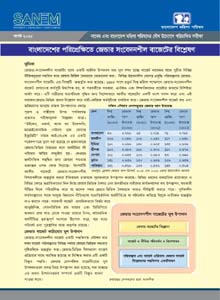SANEM-BMP policy brief on an analysis of gender-responsive budgeting: Bangladesh perspective
 Gender-responsive budgeting (GRB) is a targeted budgetary instrument implemented into multiple developing countries’ fiscal plans. GRB ensures that policy prescriptions to address gender inequality are translated into outputs by binding them to budgetary allocations. Gender-responsive budgeting (GRB) was initially put forward during the Fourth World Conference on Women in Beijing, China, in 1995. Developing countries employ gender-responsive budgeting (GRB) as a financial strategy to address gender inequality by matching budgetary provisions with policy initiatives. It goes beyond women-centric programmes by openly devoting budgetary funds towards the advancement of women and by assessing the gendered effects of those funds.
Gender-responsive budgeting (GRB) is a targeted budgetary instrument implemented into multiple developing countries’ fiscal plans. GRB ensures that policy prescriptions to address gender inequality are translated into outputs by binding them to budgetary allocations. Gender-responsive budgeting (GRB) was initially put forward during the Fourth World Conference on Women in Beijing, China, in 1995. Developing countries employ gender-responsive budgeting (GRB) as a financial strategy to address gender inequality by matching budgetary provisions with policy initiatives. It goes beyond women-centric programmes by openly devoting budgetary funds towards the advancement of women and by assessing the gendered effects of those funds.
Moreover, gender-responsive budgeting is a major concern globally as well as in our country. It is a strategic approach that involves working thoroughly to integrate gender perspectives at various stages of the budget plan, including Gender Budget Analysis, modifications and adjustments to budgets and policies, Gender budget analysis should be systematically incorporated into planning and budgeting. Bangladesh can deepen its commitment to gender equality, women’s empowerment, and inclusive development by resolving outstanding issues and building on its current accomplishments. Moreover, a higher level of gender equality promotes the idea of equal pay for work of equal value, works to stop discrimination, combats pay discrimination and offers financial support and incentives to people, families, and communities at large in order to encourage a shift in or elimination of discriminatory attitudes.
